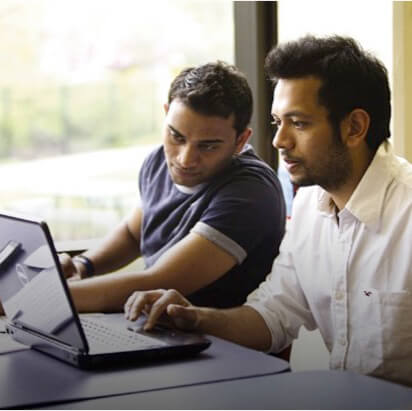Expansive Graduate Assistantship Opportunities
The employment of Graduate Assistants (GA) is a well-established and successful practice in higher education. At Monmouth University we recognized the value of GAs for educating graduate students as developing professionals in training, for the important roles GAs serve in interacting with, mentoring, inspiring and helping undergraduate students and fellow graduate students, and for providing critical support to graduate faculty. Various opportunities exist for developing professionals in training, including as graduate teaching assistants and as graduate research assistants. See below to learn about the different types of assistantships.
Office of Graduate Studies
Great Hall 210Phone: 732-571-7550
Graduate Assistants
Graduate Assistants (GA) may work in any division of the University in roles that do not necessarily provide direct, substantive or sustained support for teaching or research initiatives. These may include clinical or administrative duties but they must be inherently related to the student’s graduate education and professional goals. Examples may include but are not limited to campus ambassador roles, support for special projects, peer mentoring and support etc. GA positions are not to be used for roles with primary responsibilities that are purely clerical or intended to provide routine secretarial, administrative or office staffing support.
Graduate Teaching Assistants
Graduate Teaching Assistants (GTAs) are graduate students who have instructional assignments in classrooms or laboratories, under the supervision of a faculty member who has ultimate responsibility for the course.
GTAs do not replace faculty in the classroom but enhance and permit instruction and instructional support to provide a higher quality educational experience than would be possible otherwise. GTAs provide valuable support to faculty and GTAs benefit from developing teaching skills and a deeper understanding of the discipline by working closely under the supervision of an experience faculty member.
GTAs may have one or more of the following responsibilities:
- coordinate or assist in instruction in laboratory courses, discussion, quiz or problems sessions, and writing experiences etc
- assist with classroom teaching (attending classes, taking notes, taking attendance, proctoring exams, tutoring undergraduate students, help to prepare lectures and discussion sessions), e-mail and other class correspondence, other duties as assigned
- meet with students or small groups, lead group discussions, and hold offices hours for supporting instruction, mentoring, consultation etc. Depending on the nature of the teaching assistantship, GTAs are encouraged to hold office hours
- support in-classroom activities under the supervision of a faculty member
- lead discussion, tutorial, or supplemental sessions of courses that are taught by a faculty member
- special sessions and class meetings under the supervision of a faculty member
- administer colloquium programs or other special session
- a GTA may have additional, related duties as assigned

Graduate Research Assistants
Graduate Research Assistants (GRA) assist in conducting research of a scholarly nature typically under faculty supervision. The work of a GRA may include but is not limited to developing specific research projects, theoretical analyses and models, gathering and analysis of data, special projects that require substantive research, externally funded projects that support GRA involvement, the production and/or publication of scholarly journals and research reports, and other examples.
Requirements for a Graduate Assistantship
- An incoming graduate student must be duly matriculated in a program and have a GPA of not less than 3.0 in his/her undergraduate education.
- After having matriculated in a program (for one or more semesters), a graduate student must have a GPA of not less than 3.0 in his/her graduate courses.
- A student may be awarded an assistantship for a maximum of 6 credits or the actual credits registered (whichever is smaller). Graduate assistantships are compensated according to a rate scale based on credits. For example, a student awarded a 3 credit assistantship will perform work that occupies approximately 7 hours per week for a 14-week semester (total 100 hours) and will receive compensation equal to the cost of 3 credits plus 15% to cover Social Security and other mandatory tax contributions. Tuition payments and applicable deductions will be withheld from the student’s pay and will be applied directly to the student’s Accounts Receivable account. Please note that a graduate assistantship does not cover fees such as comprehensive fees, laboratory fees, graduation fees, etc.
- If a graduate assistant is also receiving a graduate scholarship, then the sum of the scholarship amount and dollar equivalent of the graduate assistantship should not exceed the student’s tuition for a semester.
- Graduate assistants must be registered for the semester that they are receiving the assistantship (i.e., graduate assistants cannot credit hours worked in one semester toward tuition for another semester).
- Upon receipt and acceptance of a graduate assistantship position, the student is responsible for the completion of an Approval and Acceptance Form, must be completed by the sponsoring department and the student for each semester for the graduate assistantship to be processed.
- Assistants will be expected to work during the hours scheduled by the sponsoring department and Assistants are expected to be available for work at the start of the semester or this may impact their eligibility for an assistantship.
- A new application/resume is required for each semester that you wish to be considered for an assistantship. Applications are not renewed automatically.
- The Office of Graduate Studies should be promptly notified if an application has to be withdrawn.



